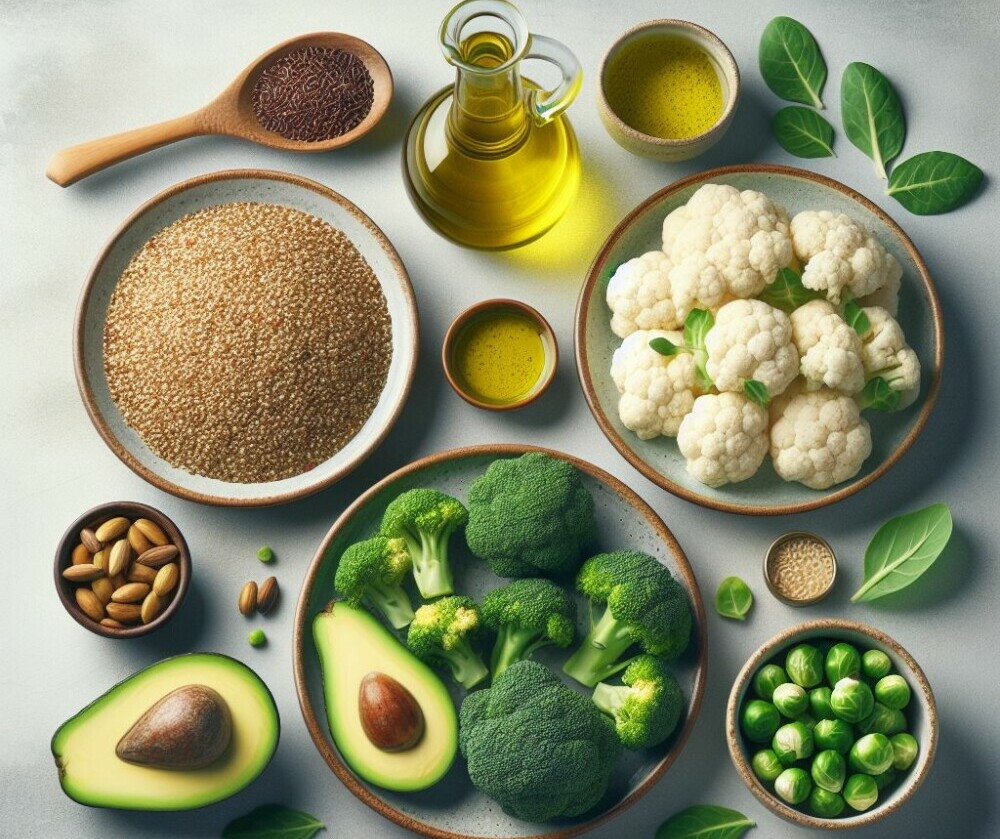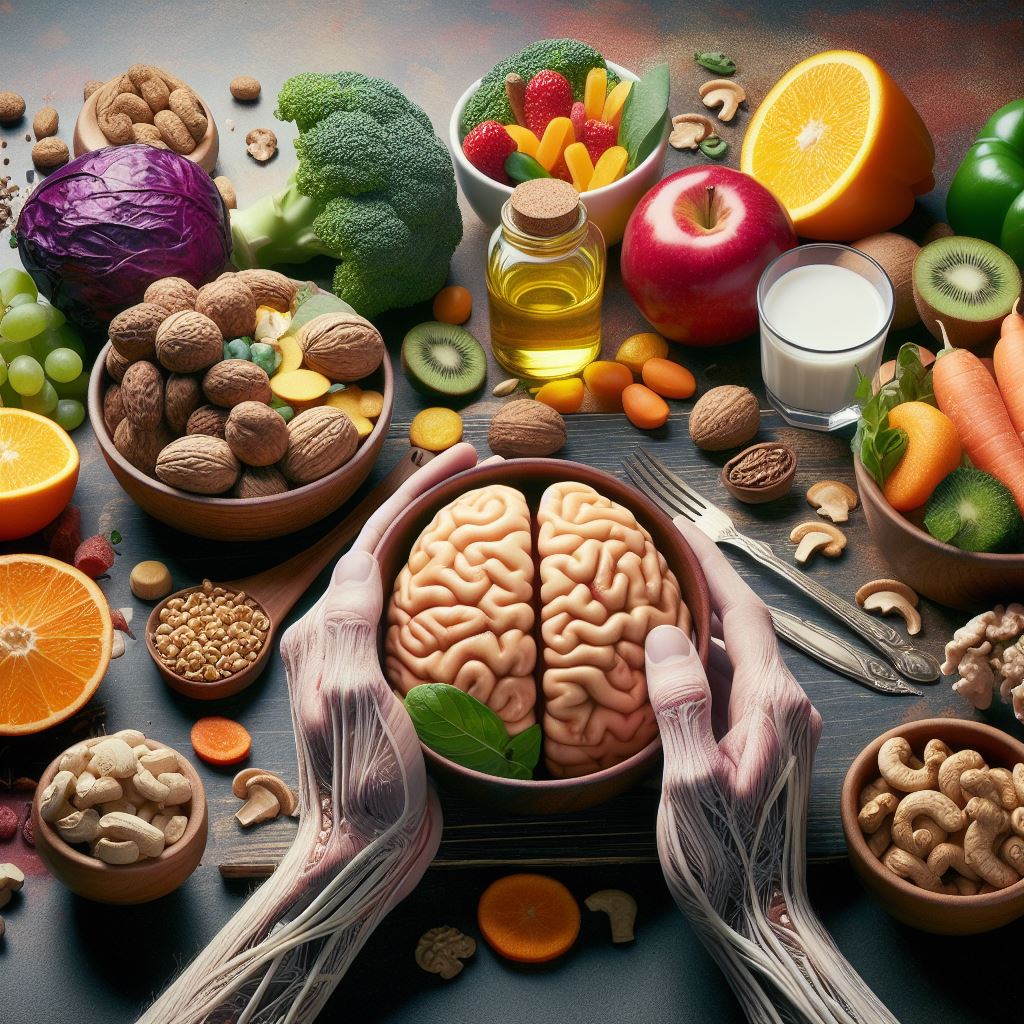Are you ready to unlock the potential of your mind and embrace a healthier, more vibrant life? Welcome to the journey of feeding your brain with purpose. Living with multiple sclerosis (MS) can present formidable challenges, but amidst the uncertainties, one thing remains clear: the power of nutrition to shape our destinies.
Picture this: a life where every bite you take is a step towards rejuvenating your brain, reducing inflammation, and optimizing your body’s natural defences. It’s not just about sustenance; it’s about empowerment. By embracing a diet rich in brain-nourishing foods, you’re not just feeding your body; you’re fueling your spirit.
Foods That Restore Brain Cells
The brain is a complex organ requiring constant nourishment to maintain its functions. For individuals with MS, whose brain cells may be under attack by their immune system, consuming foods rich in nutrients that support brain cell restoration is crucial. Here are some foods to consider:
 Nuts and Seeds: Nuts and seeds are an excellent addition to everyone’s diet, but they particularly contribute to brain health. Compared to other types of nuts, walnuts offer double the antioxidants and are an excellent source of alpha-linolenic acid (ALA), an essential omega-3 fatty acid that helps suppress cognitive decline, inflammation, and oxidative stress. Consuming a handful of walnuts daily is recommended for their brain-supportive benefits.
Nuts and Seeds: Nuts and seeds are an excellent addition to everyone’s diet, but they particularly contribute to brain health. Compared to other types of nuts, walnuts offer double the antioxidants and are an excellent source of alpha-linolenic acid (ALA), an essential omega-3 fatty acid that helps suppress cognitive decline, inflammation, and oxidative stress. Consuming a handful of walnuts daily is recommended for their brain-supportive benefits.
 Mushrooms: Certain types of mushrooms contain compounds that stimulate nerve growth and support brain cell regeneration. Research has shown that species like lion’s mane contain active compounds that encourage nerve growth and memory improvement. Other varieties of mushrooms contain high levels of antioxidants, which reduce the risk of many diseases. Including mushrooms, especially varieties like lion’s mane and boletus, in your diet is beneficial for brain health.
Mushrooms: Certain types of mushrooms contain compounds that stimulate nerve growth and support brain cell regeneration. Research has shown that species like lion’s mane contain active compounds that encourage nerve growth and memory improvement. Other varieties of mushrooms contain high levels of antioxidants, which reduce the risk of many diseases. Including mushrooms, especially varieties like lion’s mane and boletus, in your diet is beneficial for brain health.
 Cocoa Powder: Rich in flavonoids and antioxidants, cocoa powder is associated with improved cognitive function and protection of brain cells from damage. Epicatechin, a flavonoid found in cocoa, enhances muscle function and physical performance, which can be significant for individuals with MS.
Cocoa Powder: Rich in flavonoids and antioxidants, cocoa powder is associated with improved cognitive function and protection of brain cells from damage. Epicatechin, a flavonoid found in cocoa, enhances muscle function and physical performance, which can be significant for individuals with MS.
Anti-Inflammatory Foods
 Inflammation is a key factor in the progression of MS symptoms. Incorporating anti-inflammatory foods into the diet can help reduce inflammation and alleviate symptoms. Some anti-inflammatory foods include:
Inflammation is a key factor in the progression of MS symptoms. Incorporating anti-inflammatory foods into the diet can help reduce inflammation and alleviate symptoms. Some anti-inflammatory foods include:
Berries: Blueberries, strawberries, and other brightly coloured berries are rich in antioxidants that combat inflammation and protect brain cells. Blueberries, in particular, are known for their high antioxidant content, which slows down ageing and fights free radicals in the body.
Fatty Fish: Salmon, mackerel, and sardines are excellent sources of omega-3 fatty acids, which have anti-inflammatory properties and support brain health.
Leafy Greens: Spinach, kale, and other leafy greens are packed with vitamins, minerals, and antioxidants that help reduce inflammation and support overall health.
Importance of Vitamin D3
Vitamin D3 plays a crucial role in immune function and may help reduce the risk of MS relapses. For individuals with MS, ensuring adequate vitamin D levels is essential. Food sources of vitamin D3 include:
Fatty Fish: As mentioned earlier, fatty fish like salmon and mackerel are not only rich in omega-3s but also provide a good source of vitamin D3.
Fortified Foods: Many foods, such as dairy products, orange juice, and breakfast cereals, are fortified with vitamin D3 to help individuals meet their daily requirements.
Sunlight: While not a food source, sunlight exposure triggers vitamin D synthesis in the skin, making it an important natural source of vitamin D3.
Supporting Hormonal Balance
 Hormonal imbalances can exacerbate MS symptoms and impact overall well-being. Certain foods can help support hormonal balance, including:
Hormonal imbalances can exacerbate MS symptoms and impact overall well-being. Certain foods can help support hormonal balance, including:
Whole Grains: Whole grains like quinoa, brown rice, and oats contain fibre and nutrients that help regulate hormone levels and stabilize blood sugar.
Healthy Fats: Avocados, olive oil, and nuts provide essential fatty acids that support hormone production and balance.
Cruciferous Vegetables: Broccoli, cauliflower, and Brussels sprouts contain compounds that support liver function and aid in hormone metabolism.
Herbs and Spices for Better Health
 Herbs and spices have been cherished for their culinary and medicinal properties since ancient times. They not only enhance the flavour and nutritional value of dishes but also offer a plethora of health benefits, including reducing inflammation, alleviating symptoms of various medical conditions, and guarding against chronic diseases.
Herbs and spices have been cherished for their culinary and medicinal properties since ancient times. They not only enhance the flavour and nutritional value of dishes but also offer a plethora of health benefits, including reducing inflammation, alleviating symptoms of various medical conditions, and guarding against chronic diseases.
1. Ginger: Renowned for its spicy warmth, ginger is rich in compounds like gingerols and shogaols, which possess potent anti-inflammatory and antioxidant properties. Incorporating ginger into your diet, whether through tea or adding it to recipes, can positively impact health, including alleviating nausea, managing blood sugar levels, and reducing inflammatory markers.
2. Oregano: A staple in Mediterranean cuisine, oregano contains terpenes like thymol and carvacrol, offering robust antioxidant benefits. Studies suggest that oregano supplementation can reduce oxidative stress markers, benefiting overall health, particularly after physical exertion.
3. Saffron: Known for its vibrant colour and bitter taste, saffron boasts compounds like crocin and crocetin, which exhibit cellular protective qualities. It shows promise in treating conditions such as depression, anxiety, heart disease, Alzheimer’s, and type 2 diabetes, potentially by increasing serotonin levels.
4. Cinnamon: With its warm, spicy flavour, cinnamon is abundant in cinnamaldehyde and other compounds with potent antioxidant and anti-inflammatory properties. Regular consumption of cinnamon may improve metabolic parameters such as blood sugar, lipids, and blood pressure.
5. Cardamom: Referred to as the “Queen of Spices,” cardamom contains phenolic compounds and volatile oils known for their antioxidant and anti-inflammatory effects. Studies indicate its potential to improve blood sugar levels, inflammatory markers, and liver health.
6. Garlic: Renowned for both its culinary and medicinal uses, garlic contains compounds that inhibit proinflammatory proteins, benefiting heart health and potentially reducing the risk of atherosclerosis.
7. Rosemary: This aromatic herb contains rosmarinic acid, offering antioxidant, anti-inflammatory, and even potential antidepressant effects. Studies suggest rosemary tea may increase Brain-Derived Neurotrophic Factor (BDNF), essential for brain function.
8. Turmeric: Widely studied for its health benefits, turmeric contains curcumin, renowned for its anti-inflammatory, antioxidant, and anticancer properties. It shows promise in treating conditions like osteoarthritis, NAFLD, and type 2 diabetes.
9. Ashwagandha: A key herb in Ayurveda, ashwagandha has shown benefits in cognitive function, athletic performance, mood, stress levels, and sleep quality, particularly in those with insomnia.
10. Nutmeg: Known for its warm, nutty flavour, nutmeg is rich in antioxidants like myristicin, which exhibit anti-inflammatory and antimicrobial properties. More research is needed to explore its potential benefits further.
11. Sage: Containing compounds like rosmarinic acid, sage has cognitive-enhancing effects and may improve mood, memory, and attention by inhibiting acetylcholinesterase (AChE), an enzyme that breaks down neurotransmitters.
12. Parsley: Rich in antioxidants like vitamin C and flavonoids, parsley offers cellular protection and anti-inflammatory effects, potentially reducing the risk of cognitive decline and heart disease.
Incorporating these herbs and spices into your diet can significantly enhance your intake of antioxidants and anti-inflammatory compounds, thus promoting overall health and reducing the risk of new relapses and progress diseases.
Dietary supplements that individuals with MS should consider incorporating into their daily regimen
Alpha-lipoic acid (ALA)
 Alongside numerous health benefits such as supporting normal glucose metabolism and heart health, ALA is particularly important for individuals with MS due to its role in maintaining nervous system health and cognitive function. Its potent antioxidant and anti-inflammatory properties help protect nerve cells from oxidative stress and damage. Clinical studies have demonstrated the following positive effects of ALA:
Alongside numerous health benefits such as supporting normal glucose metabolism and heart health, ALA is particularly important for individuals with MS due to its role in maintaining nervous system health and cognitive function. Its potent antioxidant and anti-inflammatory properties help protect nerve cells from oxidative stress and damage. Clinical studies have demonstrated the following positive effects of ALA:
-
- Facilitating nerve impulse conduction and stimulating signalling pathways involved in memory formation.
- Slowing the progression of nerve damage and associated memory loss.
- Alleviating pain and neuropathic sensations like tingling and pins-and-needles.
ALA can be obtained through supplements or dietary sources rich in ALA such as spinach, broccoli, liver, yeast, eggs, walnuts, brown rice, and chicken breast. Incorporating these foods into various meals ensures a diverse and optimal intake of alpha-lipoic acid.
Rhodiola
 Rhodiola, a plant known in traditional Chinese medicine since ancient times, grows in the arctic regions of Europe and Asia. It has been historically used by cultures like the Vikings and even astronauts to enhance physical strength, endurance, and cognitive function. Rhodiola exhibits potent adaptogenic effects, modulating the body’s response to stress, which can greatly benefit individuals with MS by supporting treatment adherence and overall disease management. It reduces physical fatigue, enhances physical performance, and aids in managing mental stress, fatigue, and depression. Additionally, it shows promise in treating anxiety disorders and addiction.
Rhodiola, a plant known in traditional Chinese medicine since ancient times, grows in the arctic regions of Europe and Asia. It has been historically used by cultures like the Vikings and even astronauts to enhance physical strength, endurance, and cognitive function. Rhodiola exhibits potent adaptogenic effects, modulating the body’s response to stress, which can greatly benefit individuals with MS by supporting treatment adherence and overall disease management. It reduces physical fatigue, enhances physical performance, and aids in managing mental stress, fatigue, and depression. Additionally, it shows promise in treating anxiety disorders and addiction.
Rhodiola can be consumed in various forms such as tinctures, tablets, or oils.
Peruvian maca
 Peruvian maca, a traditional supplement with centuries of use, is renowned for its nutrient-rich profile and its potential to support hormonal balance. Hormonal equilibrium is crucial for overall bodily function, encompassing reproductive hormones as well as those from the adrenal and thyroid glands. Peruvian maca, historically used in the Americas for issues like female infertility, can help maintain hormonal harmony.
Peruvian maca, a traditional supplement with centuries of use, is renowned for its nutrient-rich profile and its potential to support hormonal balance. Hormonal equilibrium is crucial for overall bodily function, encompassing reproductive hormones as well as those from the adrenal and thyroid glands. Peruvian maca, historically used in the Americas for issues like female infertility, can help maintain hormonal harmony.
Ensuring balanced hormone levels is vital for optimal health, and Peruvian maca offers a natural means of supporting this balance. Peruvian maca is my favourite supplement and I wrote about it in the post “Power of Peruvian Maca – Exploring Health Benefits and Varieties of Peruvian Maca Root Powder“
Including foods that strengthen the brain, provide anti-inflammatory benefits, offer sources of vitamin D3, and support hormonal balance in the diet can play a significant role in managing MS symptoms and supporting overall brain health. While nutrition alone cannot cure MS, it can complement medical treatments and help individuals with MS lead healthier, more fulfilling lives.
So, dear friend, are you ready to embark on this journey of self-discovery and empowerment? Are you ready to nourish your brain with purpose and embrace a life of vitality? The choice is yours, and the journey awaits. Together, let’s feed our brains, fuel our spirits, and unlock the boundless potential within.
So far, after 5 years of diagnosis, I am certain that my diet has played a major role in my life’s struggle with MS. If I can help in any way, please feel free to contact me.
Elena
References
- 16 Evidence-Based Lifestyle Changes to Protect Your Brain Health in Multiple Sclerosis – Achilles Neurology Clinic BH
- Diet and Multiple Sclerosis – National MS Society
- Diet and disease-related outcomes in multiple sclerosis: A systematic review of clinical trials – NLM
- MIND Diet Impact on Multiple Sclerosis Patients: Biochemical Changes after Nutritional Intervention – International Journal of Molecular Sciences
- Multiple Sclerosis (MS) Diet – Mass General Brigham
- The Role of Diet and Interventions on Multiple Sclerosis: A Review – NLM
Disclaimer
This article is intended for general informational purposes only and should not replace professional medical or nutritional advice. Individual dietary needs for multiple sclerosis can vary widely. Please consult a qualified healthcare provider or registered dietitian before making changes to your diet.
About the Author
Elena is the voice behind MS Experience, where she combines compassion, research, and lived insight to support people navigating life with multiple sclerosis. Her writing aims to nourish both the mind and soul—one thoughtful post at a time. When she’s not writing, you’ll catch her exploring wellness practices, experimenting with nourishing recipes, or unwinding with a good book.


Hello Elena, your guide on nourishing the brain for multiple sclerosis patients is incredibly comprehensive and empowering! You’ve provided a wealth of information on foods that support brain health, reduce inflammation, and maintain hormonal balance, all crucial aspects for individuals living with MS. Your emphasis on incorporating a variety of nutrient-rich foods, herbs, and spices into the diet demonstrates a holistic approach to managing MS symptoms and promoting overall well-being.Your personal experience with MS and the positive impact of diet on your life adds authenticity and inspiration to your message. Thank you for sharing your knowledge, insights, and willingness to support others on their journey toward vitality and wellness. Your dedication to helping others navigate the challenges of MS is truly commendable.
Thank you so much for your thoughtful comment! I’m thrilled to hear that you found the guide comprehensive and empowering. It means a lot to me to know that the information I shared resonated with you.
Indeed, I aimed to provide a thorough overview of foods that support brain health, reduce inflammation, and maintain hormonal balance, recognizing their significance in managing the challenges of multiple sclerosis (MS). Your acknowledgement of the holistic approach I advocate, which includes incorporating a diverse array of nutrient-rich foods, herbs, and spices into the diet, perfectly encapsulates the essence of my message.
Your kind words reaffirm the importance of community support in navigating the complexities of living with MS. I’m genuinely touched by your encouragement and grateful for your willingness to engage with the content.
Lastly, I wholeheartedly agree with your point about the importance of these brain-nourishing foods for everyone, not just those with MS. Prioritizing our brain health through proper nutrition is indeed crucial for overall well-being, and I’m glad you highlighted this aspect.
Once again, thank you for taking the time to share your feedback and support. It truly means the world to me.